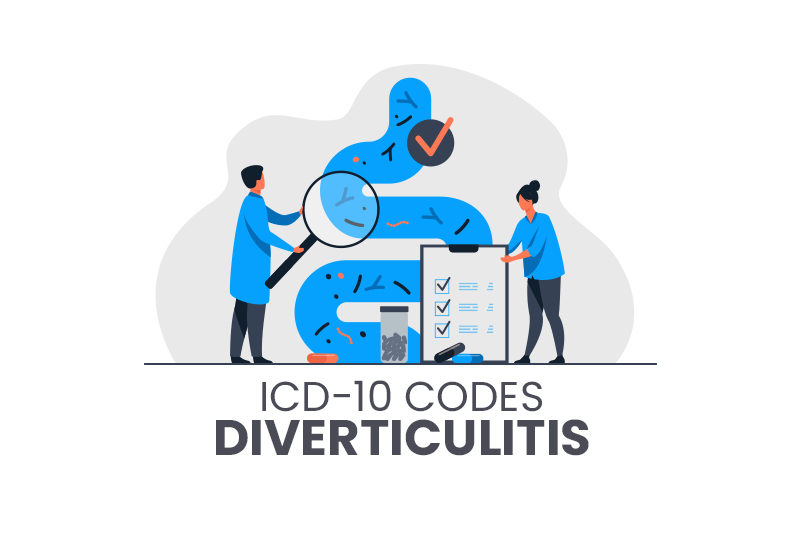Accurate ICD-10 coding for diverticulitis is essential in gastroenterology medical coding to ensure proper documentation and reimbursement. Medical coding outsourcing companies play a vital role in staying current with evolving coding guidelines, helping client physicians avoid claim denials and costly billing errors. In this post, we explore the key aspects of coding diverticulitis correctly and how partnering with a specialized gastroenterology medical coding company—staffed with certified coders—can streamline the billing process and support revenue cycle efficiency.
Understanding Diverticulitis and Its Coding Challenges
A common gastroenterology condition, diverticulitis refers to small pouches or pockets (diverticula) that occur within the wall or lining of any specific portion of the digestive tract. Generally, the condition is categorized based on severity, complications, and the presence or absence of abscesses, perforation, or fistulas. The complexity of these classifications makes coding for diverticulitis particularly challenging. Understanding the diverticular disease classification in ICD-10 is essential for accurate medical coding, as it distinguishes between cases with and without complications such as perforation, abscess, or bleeding.
ICD-10 Codes for Diverticulitis
Diagnosis of diverticulosis involves a detailed medical history review, physical examination, blood tests and symptom evaluation to analyze bowel movements and other signs of pain and tenderness. Diagnosis tests like CT scan, X-ray, or a colonoscopy may be performed. If the gastroenterologist suspects that a person may have diverticulitis, additional tests may be ordered. The physician documentation in the medical record determines the coding and sequencing for diverticulosis. Accurate ICD-10 coding captures the specific type and severity of diverticulitis, which may influence treatment plans and insurance reimbursements.
In ICD-10-CM, diverticulitis is coded under the K57 category. The codes include location (small, large or small and large intestine), with or without perforation or abscess, and with or without bleeding.
- K57 Diverticular disease of intestine
- K57.0 Diverticulitis of small intestine with perforation and abscess
- K57.00 …… without bleeding
- K57.01 …… with bleeding
- K57.1 Diverticular disease of small intestine without perforation or abscess
- K57.10 Diverticulosis of small intestine without perforation or abscess without bleeding
- K57.11 Diverticulosis of small intestine without perforation or abscess with bleeding
- K57.12 Diverticulitis of small intestine without perforation or abscess without bleeding
- K57.13 Diverticulitis of small intestine without perforation or abscess with bleeding
- K57.2 Diverticulitis of large intestine with perforation and abscess
- K57.20 …… without bleeding
- K57.21 …… with bleeding
- K57.3 Diverticular disease of large intestine without perforation or abscess
- K57.30 Diverticulosis of large intestine without perforation or abscess without bleeding
- K57.31 Diverticulosis of large intestine without perforation or abscess with bleeding
- K57.32 Diverticulitis of large intestine without perforation or abscess without bleeding
- K57.33 Diverticulitis of large intestine without perforation or abscess with bleeding
- K57.4 Diverticulitis of both small and large intestine with perforation and abscess
- K57.40 …… without bleeding
- K57.41 …… with bleeding
- K57.5 Diverticular disease of both small and large intestine without perforation or abscess
- K57.50 Diverticulosis of both small and large intestine without perforation or abscess without bleeding
- K57.51 Diverticulosis of both small and large intestine without perforation or abscess with bleeding
- K57.52 Diverticulitis of both small and large intestine without perforation or abscess without bleeding
- K57.53 Diverticulitis of both small and large intestine without perforation or abscess with bleeding
- K57.8 Diverticulitis of intestine, part unspecified, with perforation and abscess
- K57.80 …… without bleeding
- K57.81 …… with bleeding
- K57.9 Diverticular disease of intestine, part unspecified, without perforation or abscess
- K57.90 Diverticulosis of intestine, part unspecified, without perforation or abscess without bleeding
- K57.91 Diverticulosis of intestine, part unspecified, without perforation or abscess with bleeding
- K57.92 Diverticulitis of intestine, part unspecified, without perforation or abscess without bleeding
- K57.93 Diverticulitis of intestine, part unspecified, without perforation or abscess with bleeding
Streamline your medical coding processes with expert support!
Contact OSI for professional medical coding outsourcing tailored for gastroenterology practices.
Key Considerations for Accurate Coding
- Detailed Documentation: To ensure accurate coding, physicians must provide detailed descriptions, including – location (small intestine, large intestine, or both) presence of complications like abscess or perforation and associated bleeding.
- Use of Combination Codes: Many ICD-10 codes for diverticulitis are combination codes. Combination codes describe the condition and associated complications. Coders must identify and apply the correct combination of codes in order to avoid under- or over-coding.
- Importance of Updates: ICD-10 codes are subject to regular, annual updates. Staying updated with these changes ensures use of the current codes, reducing the risk of claim denials.

Gastroenterology coding for diagnostic and therapeutic procedures can be challenging. ICD-10 coding for diverticulitis requires attention to detail and thorough understanding of the associated conditions and complications. Partnering with a company providing specialized medical coding support for GI specialists and surgeons ensures accurate coding and billing. With proper diverticulitis diagnosis documentation, certified professional medical coders can report diverticulosis using the right ICD-10 codes, supporting fast and clean claim submission for faster processing, fewer rejections, and improved reimbursement.




